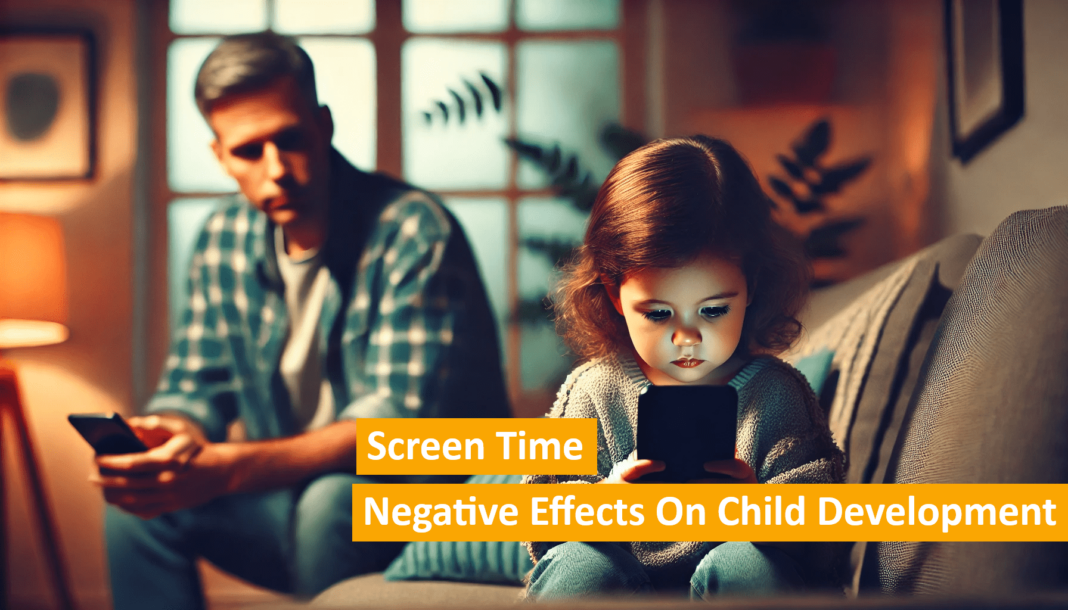Did you know that children as young as 1 year old exposed to more than four hours of screen time per day are at risk of delayed communication and problem-solving skills by age 4? A study in the Journal of the American Medical Association of Pediatrics says that kids’ increased screen time affects how they learn, grow, and connect with the world.
To promote healthy cognitive, social, and emotional growth, parents, teachers, and childcare providers need to know how screen time affects kids. This blog explores the negative effects of screen time on child development while offering actionable solutions to balance and improve children’s interactions with digital devices.
The Impact of Screen Time on Cognitive Development
Delayed Language Development
Research (from Google scholars) confirms that learning a language is more convincing by face-to-face interaction with kids instead of screens. For example, kids younger than 2 find it hard to learn from videos, and kids and adults who spend a lot of time together in front of a computer can’t connect either. So, between the ages of 1.5 and 3, kids start learning a lot of words. If they’re spending too much time on screens, it can stop them from picking up new words because they aren’t communicating enough.
Reduced Attention Span
When kids are always looking at fast-moving graphics on screens, it can make their attention span shorter. The brain learns to focus early on, but screens can mess with that by overwhelming kids with too many bright, busy images. However, reading stories out loud is a better choice because it helps kids focus and listen, which is good for their brain development.
Impaired Executive Functioning
Excessive screen usage may weaken critical thinking and problem-solving skills, collectively known as executive functioning. Because screens demand passive engagement rather than active thinking, children miss opportunities to solve problems, imagine, and process difficult scenarios—all essential for academic and life success.
The Case for Good Screen Time
Meanwhile, not all screen time is harmful. When used appropriately; some media activities can improve learning and creativity, especially with parental involvement. Here’s a breakdown of recommended practices by age:
Under 18 Months: Avoid screen media except for video chatting.
18–24 Months: Introduce high-quality programs, but watch together to help children understand what they see.
Ages 2–5: Limit to 1 hour daily of high-quality content, ensuring caregivers co-view and engage with children.
Ages 6–12: Balance screen time with sleep, physical activity, and other essential behaviors.
12 and Older: Being their parents, you can nominate a place in your home where there are no screens, like during meals, or avoid having them in bedrooms, and set aside family time where everyone puts away their devices.
Social and Emotional Effects of Screen Time
Reduced Social Skills
For young kids, screens can take the place of important face-to-face interactions. When they’re focused on screens, they miss out on playing games, laughing together, and having conversations—things that help them build social skills like talking to others and working as a team.
Decreased Empathy
Normally, kids learn to read emotions and understand body language by watching and interacting with people. However, too much screen time can get in the way of this, making it harder for them to feel empathy and communicate with others emotionally.
Linked To Mental Health Issues
Several studies link prolonged screen use to an increased risk of anxiety, depression, and low self-esteem in children. By replacing outdoor play, family bonding, and exploration with passive screen viewing, children miss experiences that help build resilience and emotional stability.
Physical Health Concerns
Sleep Disturbances
Blue light from screens interferes with melatonin production, disrupting sleep patterns in children. Browsing on a tablet or phone before bed lowers the quality and duration of sleep, which has a ripple effect on mood, learning, and growth.
Increased Risk of Obesity
The sedentary nature of screen time reduces physical activity, leading to weight gain and obesity. Coupled with frequent snacking during screen use, this behavior increases the risk of health conditions like diabetes, heart disease, and poor self-esteem.
Guidelines For Parents And Educators
-
Set Screen Time Limits
Stick to age-appropriate screen time guidelines to make sure kids healthily use devices. Setting clear rules about how much screen time is okay each day helps stop them from using screens too much.
-
Encourage Alternative Activities
Encourage hobbies like reading, playing sports, drawing, or doing puzzles. These activities boost creativity, help with motor skills, and get kids interacting with others.
-
Designate Screen-Free Spaces
Designate areas like bedrooms and meal tables as screen-free zones to intentionally disconnect from devices. This simple step can significantly improve family bonding and encourage healthier habits.
-
Watch As A Family
Whenever children use screens, join them. Co-viewing helps them consume age-appropriate, beneficial content and learn to process it meaningfully.
-
Be A Role Model
Children emulate adults’ behavior. If you practice healthy screen habits—like putting away your phone during conversations or prioritizing outdoor activities—they are more likely to do the same.
Restoring Balance For A Brighter Future
Excessive screen time doesn’t just impede a child’s development—it shapes their future. By prioritizing balance, parents and educators can empower children to thrive cognitively, socially, and emotionally.
Take proactive steps today to ensure your child’s screen habits are helping rather than hindering their growth. By fostering a blend of real-world play, human interaction, and mindful screen use, we can unlock the full potential of every developing mind.


